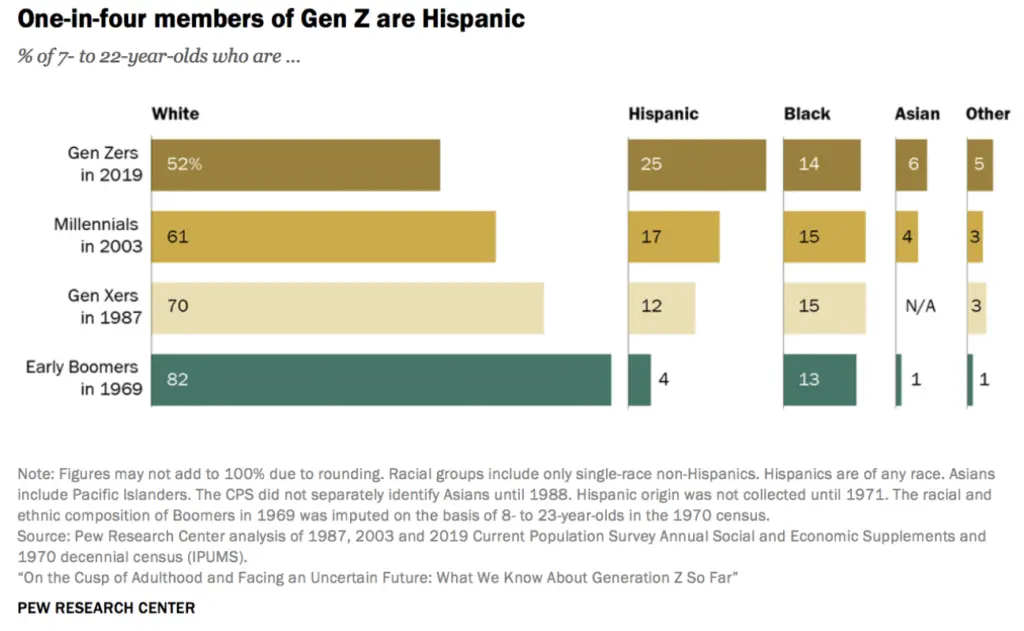Change happens with every new generation. And in many ways, Gen Z, who are primarily children of Gen X and older Millennials, were raised with different expectations. Rather than having conversations about why Gen Z are not working the same way that their older counterparts are, we should be asking them what they would like to see from us in terms of support.
Keep in mind: Within the next two decades, Gen Z workers will be entering management and leadership positions. Embracing their way of thinking and encouraging them to make a difference now will help them to feel more confident in positions of leadership and change later on.
What do we know about Gen Z?
Some important events that have shaped Gen Z’s lives and development include:
- The normalization of social media sites like TikTok, Instagram, and Snapchat
- The monopoly of smartphones
- The Great Recession
- The COVID-19 pandemic
- The elections of Barack Obama and Donald Trump
While we have all collectively experienced these events, they have had a direct impact on the development and shaping of Gen Z and especially their relationship to work.
For example, this generation has only known lives in the digital age. Though millennials have also grown up with abundant technology at their fingertips, Zoomers are the first to be true digital natives, a term coined by writer Marc Prensky in 2001 when the oldest among Gen Z was barely in kindergarten!
These factors come with a variety of benefits and drawbacks influenced by the shared experiences of the entire generation. As a result, we need to embrace these differences to create a workplace that Gen Z actively wants to be in.
What does Gen Z want from the workplace?
Every generation enters the world of work with a clear idea about the environment they want to work in.
- Baby boomers want stability and loyalty, to go to the same company for 30+ years, and to be rewarded for their time invested.
- Gen X likes independence and a good work/life balance, to know that they could show up and be trusted to deliver the results expected of them.
- Millennials desire collaboration and a real purpose behind their work, to have not just a profession but a vocation, and to be offered chances to learn and grow as they advance in their roles.
It is only fair that we respect Gen Z and what they want out of their work arrangement. After all, older generations have all had the opportunity to make changes that have benefited their working environments for everyone.
Some of the values Gen Z wants to see include:
- Diversity
- A well-defined company culture
- Flexibility
Let’s elaborate on those points a bit more.
Diversity (DEIB)
Gen Z workers are the most diverse generation we have seen thus far in several countries, especially the US. According to Pew Research, Gen Z’s racial makeup is:
- 52% White
- 25% Hispanic
- 14% Black
- 6% Asian
- 5% Other
That stands in stark contrast to the Boomer generation in the US, which in 1969 was 82% White, 13% Black, 4% Hispanic, and 1% everything else.

This distinct level of diversity, even between Gen Z and their parents, Gen X, is reflected in how they engage with others in their personal lives and at work. Gen Z workers are more likely to accept many different backgrounds regardless of gender, race, ethnicity, disability, and neurodiversity, to name just a few.
With the firm belief that society should rightfully offer space for all people, they will expect their workplaces to offer support for the needs of them and their colleagues. This is why 75% of Gen Z workers would reconsider applying to a company if that company’s approach to DEI doesn’t measure up.
What’s more, they expect the minority voices in their companies to be uplifted and supported. In a 2020 survey, Monster found that 83% of Gen Z said that a company’s commitment to diversity and inclusion is an important factor when choosing an employer.
Defined company culture
Gen Z employees also want to work for companies that have a strong and well-defined company culture. They want to work for a company that has and mentors its employees in a clear shared set of beliefs, standards, and behaviors across the organization.
This is not a bad thing for employers. In fact, it’s a brilliant way to unite across the generational divide as it helps to align everyone in terms of goals and attitudes.
A strong and inclusive company culture really showcases the personality of the company at large and can aid with recruitment and even just making a new employee feel like a member of the team.
Flexibility (Especially WFH)
Like Millennials before them, Gen Z really value flexibility in their schedule. The traditional Monday-to-Friday 9-to-5 is not something Gen z workers want for themselves. Deloitte underscored this in a 2023 trends post, “It’s not a stretch: Gen Z and Millennials want flexibility and balance.”
Based on its ongoing Gen Z and Millennial Survey, Deloitte explained that “Less than 2 in 10 respondents (of both groups) want a fully remote work pattern, in which they don’t go to a physical workplace at all, signaling that some in-person collaboration with colleagues is important to these generations—but they want it to be on their terms.”
From 4-day work weeks to the option to work from home, either full-time or on a hybrid basis, Gen Z want their jobs to fit into their daily schedule and for in-person collaboration to happen around their life and productivity. They do not want to build their days around their work hours.
What Are Some of the Issues Gen Z Faces in the Workplace?
We are calling these “issues” as they can cause some friction in a workplace environment, but there’s nothing inherently wrong with them. The reality is that these encompass broader issue at work and a difference in traditional workplace demands versus what Gen Z workers want or need to succeed.
Generation “quit”
One of the nicknames Gen Z employees have found attached to them is Generation Quit. While it is true that 72% of Gen Z workers considered switching jobs in 2023, it is a much more nuanced issue than these employees simply not wanting to work.
As we now know, Gen Z has some very clear ideas about the type of workplace they want to engage with. Why should they tolerate a workplace that does not accommodate their needs and expectations? If their job is impacting their physical and mental health, and if there are better opportunities elsewhere for them, they should be free to move on. On the other hand, employers should be working to create an environment that welcomes Gen Z, too.
Old dogs, new tricks
Sometimes, Gen Z can have a clear understanding of their expectations and an actionable plan to bring these changes to their place of work. Rather than finding colleagues amenable to change, they instead experience resistance from older generations who are unwilling to change. On the surface, it is a textbook case of “you can’t teach an old dog new tricks.”
These other generations, unwilling to learn, might cause friction as they refuse to even consider the policy changes the Gen Z employee might wish to introduce. Management and HR need to ensure that there is an inclusive culture where any employee feels comfortable making suggestions, knowing that their contributions will be taken seriously.
Too “woke”
Previous generations often accuse Gen Z and younger millennials of being “too woke,” a controversial term connected to the recognition of cultural and social injustices and the demand for change. In fact, businesses leaning in on transformational and important changes to DEIB are typically spearheaded by Millennial and Gen Z workers, but have come at the cost of negative sentiment and memes such as “get woke, go broke.”
Again, this can be connected to resistance to change, as illustrated in the point above. Gen Z is refusing to tolerate potentially damaging mindsets in the workplace. This can be a sensitive area to navigate as it requires people of older generations to check their biases and potentially shift their ways of thinking. However, overall, these considerations can create a more welcoming and inclusive workplace.
How Can Companies Succeed in Attracting and Mentoring Gen Z in the Workplace?
Gen Z employees might seem to approach their workplaces with a long list of demands that have to be met, or they are just going to jump ship for another opportunity. This is not true at all.
It comes down to properly aligns business goals with worker needs and motivations. This was something I learned teaching Gen Z students on the cusp of their college and early careers. If you can make the work interesting, you can get the most out of their efforts and desire to succeed. Additionally, the better you can connect with their interests, the more likely you are to win their trust, favor, and support for your goals, as well.
Mentoring that actually benefits Gen Z
Mentoring is a fantastic option for all, and it can be a great way to connect different generations. There is something to learn from everyone, and mentorship programs can help younger workers with career development and the acquisition of soft skills. Gen Z needs to be matched with the right mentors from the beginning so that they can build a mutually beneficial relationship that will benefit both of them.
It’s not all about what Gen Z can learn, however. It might also be about what they can teach.
Reverse mentoring is a brilliant scheme that pairs a younger and junior mentor with an older mentee who would usually take on the mentorship role. It is one of the best ways to bridge those tricky generation gaps and really begin to foster diversity and inclusion as a company-wide policy.
Support with career mapping
There is no denying that Gen Z employees are not afraid to change jobs if their current role is not serving them in the way they envision. Rather than close off routes to make them feel like they have no option but to stay put, senior management should instead recognize that the Gen Z employee’s role might be just one stepping stone in a much wider career path.
Working with a mentor to plan and navigate a career map can be a great option. It gives the employee a sense of where their career can take them, and how their transferrable soft skills might benefit them as they advance.
Make well-being a company-wide priority
Why stop at making just one generation comfortable in the workplace? Since we have opened up these discussion channels across the whole company, it is only natural that we take a look at changes that can be made for everyone. After all, the introduction of flexible working patterns or employee resource groups for minorities should never be just for younger workers.
Introducing more accessible well-being policies will benefit employees of any age and can create a more inclusive workplace that puts value on all who work there. By creating an environment that actively cares for the physical and mental health of employees, along with the chance to develop new skills and truly collaborate with each other, you create a workplace that people want to put time and energy into.
Gen Z Is ready to work
It is a complete myth to say that Generation Z is in no way interested in working. Just like others before them, they see areas of the world of work that they currently don’t like, and so they naturally want to change them.
We can even see this in the viral TikTok from user lohannysant, showcasing her struggles with the fatigue of job applications, rejections, and uncertainty. There is a place for Gen Z in the workplace, but it is on the organizations themselves to create something that is truly beneficial to these young people at the start of their adult lives.
More often than not, organizations need to take a look at what they are doing that currently doesn’t attract the attention of Gen Z. With some careful policy changes and the commitment to create a learning and working environment that actively supports these younger workers, more businesses will discover that they are just as committed as any other generation.
A robust mentoring program is the perfect way to ensure that Gen Z feel heard, valued, and empowered in the workplace. Contact us today to learn how our mentor matching can build those valuable connections between the leaders of tomorrow, and those who can offer them the best insights.




